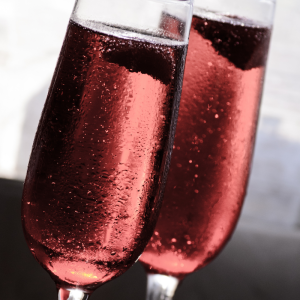 This may seem oxymoronic on what is traditionally a heavy drinking day but one of the best ways to ring in a happy and healthy new year is to stop drinking alcohol, or certainly to drink less. Personally, I find it easier to not drink at all than to stop at one. So, to use an apt holiday metaphor, I advocate quitting cold turkey* with Dry January.
This may seem oxymoronic on what is traditionally a heavy drinking day but one of the best ways to ring in a happy and healthy new year is to stop drinking alcohol, or certainly to drink less. Personally, I find it easier to not drink at all than to stop at one. So, to use an apt holiday metaphor, I advocate quitting cold turkey* with Dry January.
We are most successful at making change where we can objectively measure improvement. Declaring “I will drink less this year” will, in all likelihood, achieve nothing. But if you give yourself an explicit goal and commit to tracking your alcohol consumption to see how you stack up, you will vastly improve your odds of success. This is where Dry January comes in.
Keep it simple with Dry January
![]() I am a fan of Dry January for it’s simplicity. The goal is “I will not drink alcohol in January”. How simple is that to remember? And keeping track is even simpler if you download the TRY DRY app, free from Alcohol Change UK, a leading UK alcohol charity. You can find it in both the Google Play Store and the Apple App Store. You can also sign up with them for coaching emails with “tips, stories from other participants and much more to help you stay dry and have a great month”.
I am a fan of Dry January for it’s simplicity. The goal is “I will not drink alcohol in January”. How simple is that to remember? And keeping track is even simpler if you download the TRY DRY app, free from Alcohol Change UK, a leading UK alcohol charity. You can find it in both the Google Play Store and the Apple App Store. You can also sign up with them for coaching emails with “tips, stories from other participants and much more to help you stay dry and have a great month”.
I also like Dry January’s cold turkey approach. Completely abstaining from alcohol will result in a more immediate and apparent positive change in your health than would a very gradual reduction. Obviously the magnitude of change will also depend on how much you were drinking to begin with. But that immediate gratification is a huge motivator to continue once January is over. A month of abstention will also help to reset your relationship with alcohol. After a month of sobriety, having a single glass of wine with dinner now and again will feel just right. Whereas before perhaps only half a bottle each night would do.
That was my journey though it took more than one Dry January for me to get there. There was a time when splitting a bottle of wine with my husband at dinner each night was the norm. Sometimes we also threw back an extra cocktail for good measure on weekend nights. If you do the math, you will see that adds up to a minimum of 17.5 drinks per week. This is well over the current recommended guidelines of one drink, or less, per day for women (and two, or less, for men). I credit Dry January with getting me started on my journey but it has taken me several years of conscientiously keeping track of my consumption to make consistent, lasting change. As the saying goes, old habits die hard.
Know your why for going dry
I admit my first attempt at going completely dry for an extended period of the time was the most difficult. I was pretty irritable, to say the least. Temptations seemed to be everywhere. So I advise you to “know your why” before you start Dry January. Think of two or three benefits you will gain by reducing your alcohol consumption. Then write them down and keep your list somewhere handy to remind you whenever you feel tempted.
Here are some to consider:
- better sleep,
- more energy,
- improved mental clarity and focus,
- happier mood,
- you and/or your liver will lose weight,
- less risk of heart disease,
- reduced risk of type 2 diabetes,
- less risk of Alzheimer’s and
- reduced risk of certain cancers.
I won’t go into more detail on these as this article does a good job of outlining these and other benefits of 30 Days Without Alcohol. I can personally attest to experiencing the first 5 benefits in my list. And so far I have been fortunate in not developing any of the latter four conditions.
Measure to make change
I will reiterate something I said earlier, however. And that is we tend to be more successful at making change when we objectively measure our progress. Two things that really helped me reduce my alcohol consumption were related to measurement.
The first was to keep track of how many drinks I had each day, accurately, using standard drink sizes. In Canada, each of the following counts as one standard drink:
- 341 ml bottle (12 oz) of 5% alcohol beer, cider or cooler,
- 43 ml (1.5 oz) shot of 40% hard liquor (vodka, rum, whisky, gin etc.) or
- 142 ml (5oz) glass of 12% wine.
As I most often drink wine, I make my life easier by counting 150 ml as one standard glass (for 5 glasses per bottle). If you wish to be more accurate, however, you could use this handy standard drinks calculator which takes into consideration both volume and percentage of alcohol. When you accurately count and record what you consume, you may find you are drinking more than you realize.
The second was noting the dramatic change in my heart rate and heart rate variability during sleep on nights when I drank alcohol. Several years ago, I started wearing an Oura Ring to track my sleep but the ring also collects data on heart rate and heart rate variability (a measure of stress). During sleep/rest, your body is meant to recover, so ideally you want your heart rate to be low and your heart rate variability to be high (as low heart rate variability indicates the body is under stress). I was quite amazed to see how even a little bit of alcohol dramatically increased my heart rate and lowered my heart rate variability compared to nights where I had not had any alcohol. Pictures are worth a thousand words, so I’ll add a few examples of my own real life data here:
Lowest and Average Heart Rate and Average Heart Rate Variability (HRV) without any alcohol:
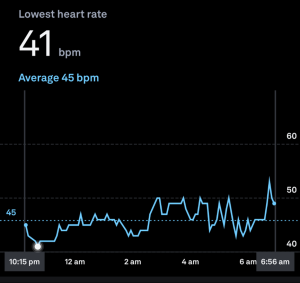
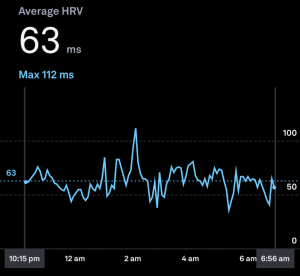
Lowest and Average Heart Rate and Average Heart Rate Variability (HRV) on a night where I’d had 1/4-bottle of 12.5% white wine:
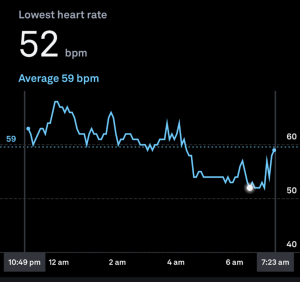
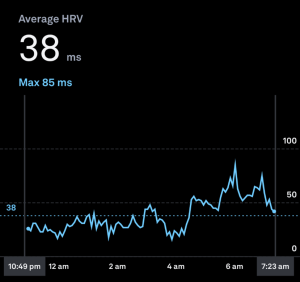
As you can see, even after just a little wine, my lowest heart rate was 11 beats per minute (bpm) higher than that of a normal night. And I didn’t even reach that until about 6:30 in the morning! My average heart rate was 14 bpm (or 31%) higher than normal. So when my heart was meant to be resting it was working 31% harder than normal.
Yes, there are other factors involved. That night I had takeout food which I notice also tends to elevate my heart rate. But after over four years of observation, I can tell you that in my n=1 study, my heart works a lot harder and gets a lot less rest when I drink alcohol. This data showed me unequivocally how my previous habit of a half bottle of wine with dinner each night could ultimately contribute to poor heart health. My sleep tracking ring turned out to be a big wake up call for me.
For kicks, I looked up my Oura results from New Year’s Eve 2020 and the results were even more dismal.
Lowest and Average Heart Rate and Average Heart Rate Variability (HRV) after partying it up with one bottle of wine:
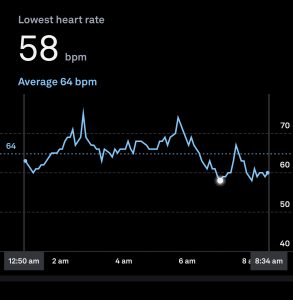
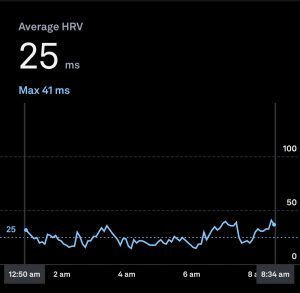
My heart rate was super high and stayed that way pretty much all night and my heart rate variability was in the basement.
Eat, drink and be merry, for tomorrow you shall be dry
So tonight on New Year’s Eve, eat, drink and be merry, for tomorrow you shall be dry. This presumes, of course, that I have convinced you to join me and give Dry January a whirl. I hope you do. Perhaps enlist your partner or a friend to join you also so you can keep each other motivated. You have little to lose and potentially so much to gain.
At the very least, according to Dr. George F. Koob, the director of the National Institute on Alcohol Abuse and Alcoholism, “taking a break from alcohol gives a person a chance to evaluate their relationship with alcohol and cultivate alternatives for relaxing, socializing, coping and other reasons why people drink.” And it’s always nice to have alternatives. Like the Classic Virgin Sangria pictured at the top of the post.
I wish you a very happy and healthy 2022!
*Those with a serious alcohol dependency should seek professional assistance to abstain from alcohol.
Thank you Laurie! I needed this kick in the butt. 🙂
I take up the challenge!
I’ve recommended your blog to enough people, I need to RESET me now.
Have been thinking of you more during the sad loss of Prashanta from our neighborhood.
Would love to see you for a catch up.
You do great work by the way!!
Libby
Thanks, Libby, and I’m glad to have company for Dry January! Would love to see you too – happy to catch up any time!
Happy New Year to you and Derrick Laurie – I am joining you for Dry January.
Day one and holding…
Kathy
Happy New Year to you too, Kathy! And congrats on day one of Dry January. I have no doubt you’ll succeed with the next 30 days as well. 🙂